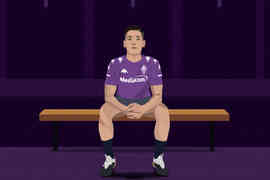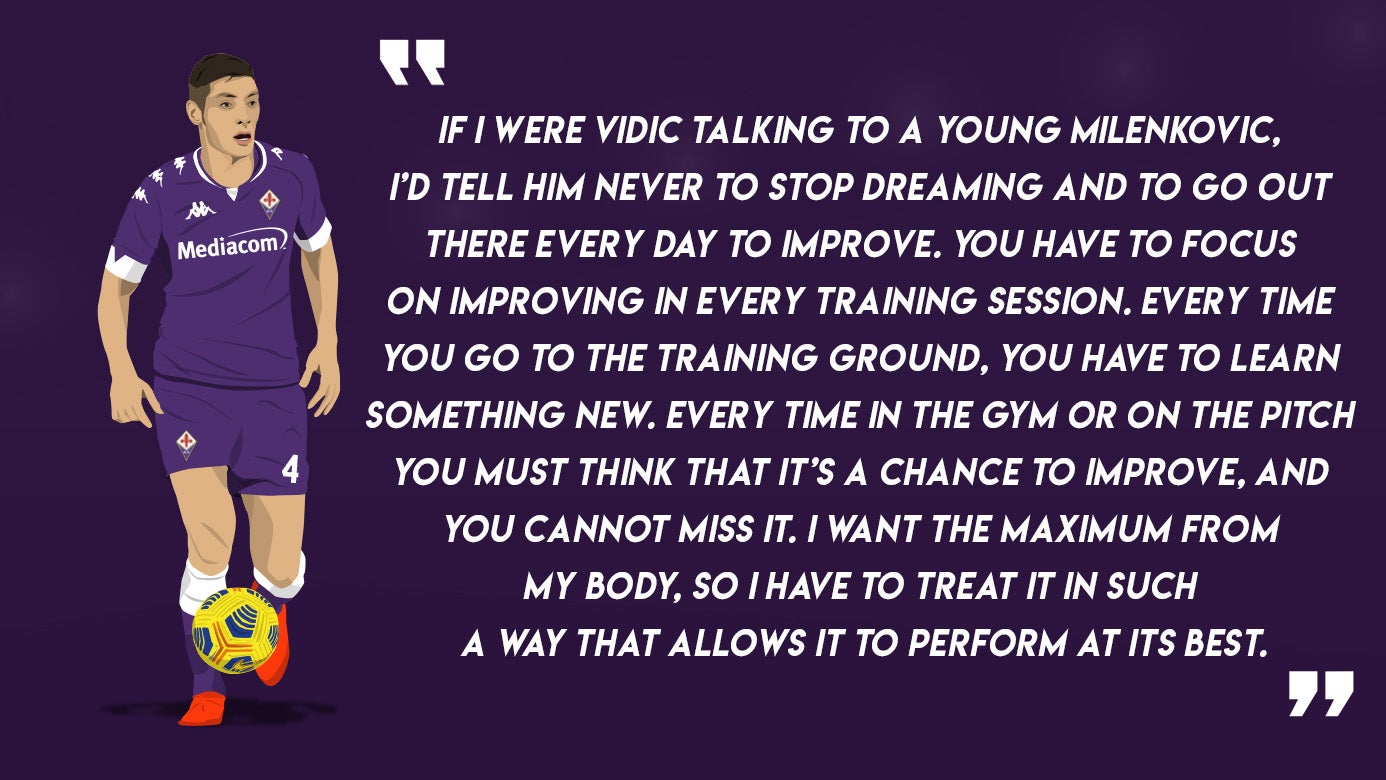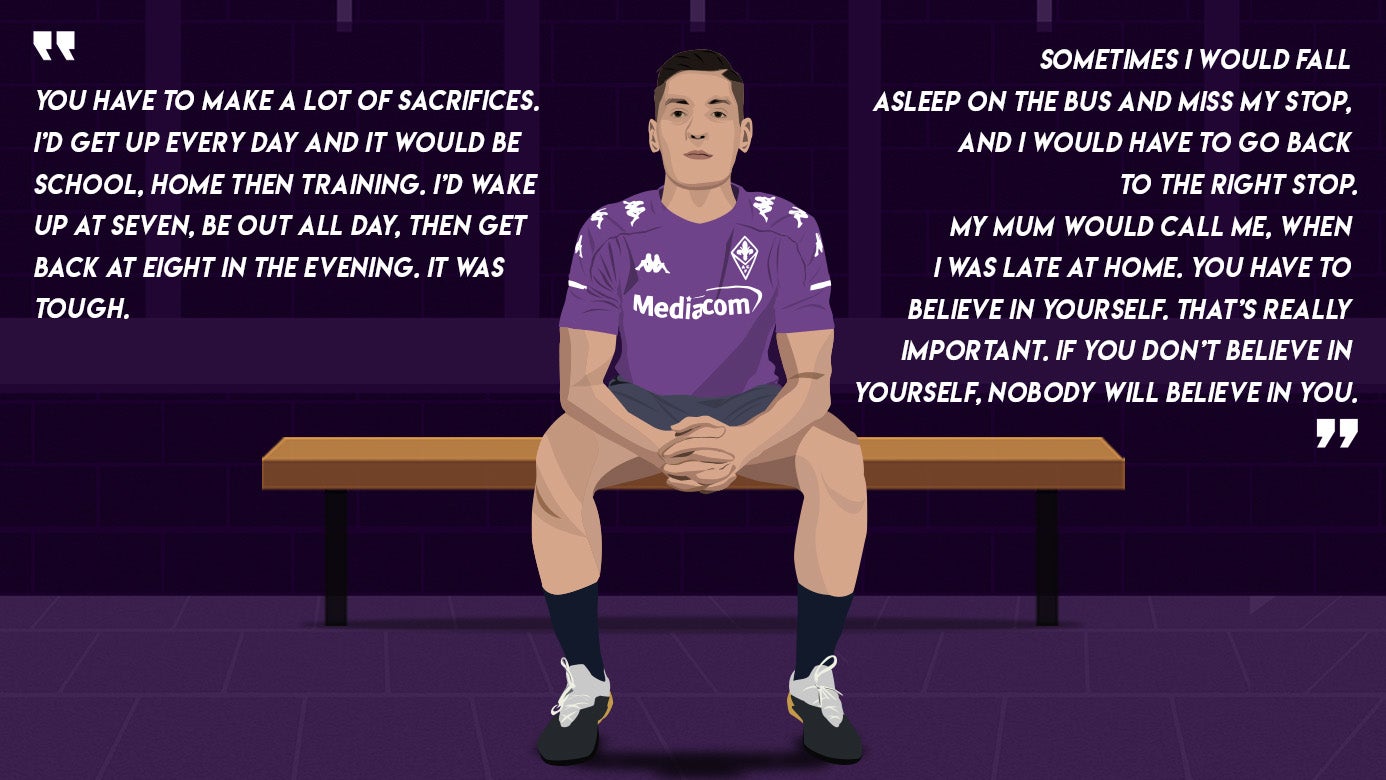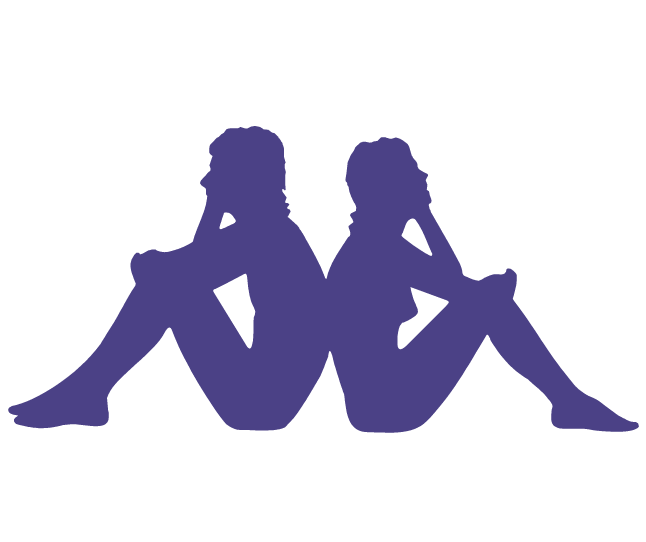
ONE ON ONE: NIKOLA MILENKOVIC
His roots, his lifestyle, being a footballer and much more. Milenkovic tells his story.
Raised in Belgrade, then from Partizan to Fiorentina. Lover of Florence, its history and culture. Nikola Milenkovic talks about his life, between sacrifices and mentality, to be a footballer and more.
BECOMING A FOOTBALLER
"My sister took me to my first training session. I was with her and my granddad. I did well straight away. I've always loved football and used to play in my neighbourhood in Belgrade. I fell in love with football from start. When I was a kid, my coach tried me out in lots of positions and eventually I ended up in defence. That was when we played on small pitches. When we moved onto the bigger pitches for 11-a-side, I played in the holding role initially, then one day I was put in defence because we were short of players – and I've stayed there ever since. That's how I became a centre-back.
“My first team was Žarkovo – that's where I took my first steps in the game. I had my first training session at Partizan when I was 13 or 14. Partizan is one of the best footballing schools in Europe: they produce some many talented players – as Fiorentina know! Lots of Partizan players have come to Italy.
My football career starting getting a bit more serious for me a Partizan. I worked my way up through the youth teams to the U19s. It wasn't easy because I didn't play all the time; sometimes I was on the bench. Sometimes I'd worry when I wasn't playing. All footballers want to play. There I had a difficult moment. I believed in myself and knew what I was capable of, but when I wasn't playing it was hard to take.
“After the U19s, four or five of us joined Teleoptik, Partizan's B team where they send players to gain experience before they go into the first team. I spent a year there and Ivan Tomic joining made a big difference. He used to coach Serbia U19s then he came to us. I was playing a lot before he joined and I was worried that with a new coach I might end up on the bench again. But he actually proved pivotal in my career because after Teleoptik he was placed in charge at Partizan and I followed him there. The first season I only played the last few games, then in my second season I played all the time.
“When I was playing for the U19s I was one of my team-mates who didn’t have a contract with the club. At that point I was hardly earning anything from football. When Ivan Tomic came in, he saw how good I was and found out I didn't even have a youth contract. He had me sign a professional contract immediately.
“It was a great move on his behalf: it wasn't easy to discover a young player who hadn't even signed a contract yet. When I started playing under him I realised things were going well and after I signed my first pro contract I knew it was getting serious. Believing in myself took me in the right direction.
“When I made my senior debut, I realised that my dream had come true and that I had to keep going."

PRESSURE AND FANS
"Partizan set out to win the title every season and any defeat is very painful. Like at Fiorentina. As players we're used to the pressure – there's a lot of it in football. What you have to do is forget the pressure and remember that football is fun, why you love the game, why you started playing in the first place. You have to go out there and not think about the pressure, only about playing football. Playing football means having fun on the pitch.
“I always get fired up by the crowd, whether its applause or boos. Applause spurs me on and if the crowd boo me it fires me up even more. Some people are more affected by pressure than others, in football like in anything else.
“The most important thing is you deal with the pressure and are aware of the fact you're doing one of the best jobs in the world."
JOINING FIORENTINA
"Joining Fiorentina was a huge step up for me. I only spent a season and a half with the first team at Partizan before coming here. There's a big difference between the Serbian league and Italian league. The first few months here were the most difficult but I tried to adapt as quickly as possible.
“I focus solely on my football and put everything into my job. I tried really hard to settle in as quickly as I could and give my all from the start. I wanted to make sure I was ready to play as soon as possible so that I could fight for a starting spot. I didn't want people to see me as the young kid who joins and takes his time to settle in before showing what he can do – I wanted to put myself in the frame for a starting shirt as soon as quickly as possible.
“After three months, in December, Stefano Pioli gave me my debut against Cagliari, when we won 1-0. It was an incredible experience for me and a surprise too. I'd always been on the bench and I didn't know I was going to play that day. In the build-up to the game German Pezzella had a small problem but we all expected him to play. After lunch the coach said he believed in me and told me I was going to play.
“It came as a surprise but I always gave 100% in training and I was ready for when I found myself in that situation. I showed I was ready too."
FIORENTINA
"I’ve had some wonderful moments at Fiorentina personally, even though three of my four seasons here have been difficult. My debut was definitely one of the best moments. And the 3-0 win over Juventus at Allianz Stadium was an incredible feeling for all of us.
“The hardest moment was definitely Davide [Astori] passing away. It was very hard for all of us.
“There have been some tough seasons here, with the exception of my first one. Things have turned out to be a lot more difficult that we expected and this season we've found ourselves in the bottom half again. All players would like to be competing for Europe. There have been lots of difficult moments, but I only remember the good times – that’s what I carry with me. I don’t want to think about negativity.
“It’s always an amazing feeling when you score, just as it is every time we play at a full stadium. It’s incredible to see passionate fans like the Viola supporters. You play football for the fans. When the stadium is full, it’s a great feeling for any player. Every time you tackle, every time you score – it’s an amazing feeling.
“All I can say is an enormous thank you for everything I’ve been given by this city, this club and these fans. I’ve become a man here at Fiorentina. The club made me feel like I’d always been here right from the very first day – they’ve enabled me to grow a lot.
“I feel that I’ve developed a lot both mentally and as a player."

LIFE AS A FOOTBALLER
"In order to get to a high level, you have to make a lot of sacrifices. That certainly applies to me. I couldn’t always go out with my friends, have fun with them – I’d get up every day and it would be school, home then training. I’d wake up at seven, be out all day, then get back at eight in the evening. It was tough. Sometimes I would fall asleep on the bus and miss my stop, and I would have to go back to the right stop. My mum would call me, when I was late at home. I didn’t have much free time, but I spent what time I did have with my friends.
“We have time for our families and friends now, but the only issue for me is being away from home. It means I can’t always be with my friends. I have more time now, at this stage of my career, whereas I had less when I was starting out.
“Generally speaking, I dedicate a lot of time to football. After group training I have individual training, then gym, then I focus on recovering. Recovery is just as important as training. I spend a lot of time on my body because I want to get 100% out of it. I’ve never been interested in drinking or smoking, for example, so it’s not an issue for me not to do those things.
“I want the maximum from my body, so I have to treat it in such a way that allows it to perform at its best."
FRIENDSHIPS IN THE GAME
"You have friends and colleagues in every dressing room. We’re all friends, but we’re colleagues too. You have a lot of different people with different personalities and characters. There’s always that respect between you, and that’s really important. We’re all friends. It’s hard to say if you’re better friends with one person or another. The main thing is respect.
“It’s on the pitch that you see the nature of the group. How we push each other, how we help each other, clapping your team-mate, having that word in their ear... You can see that on the pitch. There are a lot of friendships in our dressing room.
“You need to be good at reading people in football. It’s important to realise who sticks with you during the tough times and who is only there for you when things are going well. You don’t need to be a genius to figure that out – to see who is a real friend and who is only looking after their own interests. If you think about that for a second, you can see it right away.
“Sometimes it can be hard. People come across as true friends, but then when things go wrong they’re not there for you. I have two or three really close friends who I stick with. It’s nice to meet people though – I like getting to know and learning from new people. You can learn from new people.
"But I think you only need two or three real friends."
SOCIAL MEDIA AND THE INTERNET
"I used to post myself – I don’t have a social media manager. I don’t really use social media because I don’t like to spend too much time on my phone. I’d rather spend time with my family, my friends and my partner. I try to use my phone as little as possible – I think that’s the right way to go.
“A lot of the interviews and posts you see on social media are all the same. As players, when you finish a game you’re the first to know if you’ve had a good game or not. We’re aware of how we perform and the fans are too. There’s no need to tell us that we’ve played badly – we’re all aware of that.
“We write messages or say things to show that we’re focused on the next game, because that’s the most important one. We obviously look back at the last game and try and improve from it. It’s a shame, but in football the next game is always the one that counts.
“We’re the first people to be disappointed. But the most important thing is to focus on the next game and to try to win it. The past counts for nothing in football – the only thing that matters is what’s to come. The matches come thick and fast, so once one is done you have to focus on preparing for the next one.
“Otherwise, you get caught up in the negativity and you’ll never get out."

FLORENCE AND ITS HISTORY
"I love the city of Florence because it has so much history. I’ve had guided tours of the Uffizi twice so I could learn about the works of art. I’ve been to Palazzo Pitti and the Boboli Gardens and many other beautiful places, again with a guided tour. I like to learn about where I live, so I wanted to find out more about it all.
“I watch films and documentaries in Italian in order to improve my vocabulary and learn more words. I’ve started reading books in Italian and about Italy too. I like learning about Italian history.”
“I love it here and that’s why I want to respect the culture and learn more about Italy and Florence."
MUSIC, FILM AND FANTASY FOOTBALL
"I like music and film – I like to start my day with music when I get up. It gives me positivity and energy. I listen to everything, all the various songs that I like. Serbian, Italian, American… I listen to all genres of music.
“I like going to the cinema to watch films too. My favourite film is The Invisible Guest.
“I’m doing terribly in fantasy football. I’m behind Dusan [Vlahovic]! My team is called Real Belgrado. I’m way off top spot. I didn’t play fantasy football in my first two years in Italy, but I heard other people talking about it. I didn’t really speak to anyone about how it worked at the start. I knew there was a game in England, but I wasn’t sure how it worked in Italy. Everyone used to talk about it, so last year I got into it.
“I started enjoying it right from the auction. It’s good for the group because we joke about it and it builds relationships within the team and the coaching staff. We often talk about it when we’re with the physios – we have a laugh.
“It’s just a game – a bit of fun – and I’m not someone who spends all day thinking about fantasy football. Obviously out on the pitch I don’t think about it. It’s a game, a bit of fun between us. It adds extra competition. We have a fantasy football group that we’re always writing in, winding each other up. Some people moan and others don’t. Some even moan even before anything has happened.
“It’s a game that brings us closer together."
ADVICE FOR YOUNG PLAYERS
"I’ve never met [Nemanja] Vidic personally – I haven’t tried yet. But I’d like to meet him! He was my favourite defender.
“If I were Vidic talking to a young Milenkovic, I’d tell him never to stop dreaming and to go out there every day to improve. You have to focus on improving in every training session. Every time you go to the training ground, you have to learn something new. Every time in the gym or on the pitch you must think that it’s a chance to improve, and you cannot miss it.
“I’ve learned something from every player with experience or quality. It’s important to learn from others. Take Franck [Ribery], for example. He has the mentality of a top player – you look at how he carries himself on and off the pitch and you realise why he’s been at the top for so long. It’s so clear. I’ve learned a lot from many players I’ve played with over the years.
“You have to believe in yourself. That’s really important. If you don’t believe in yourself, nobody will believe in you.
“Don’t ever stop dreaming. Every now and then, dreams come true."
FUTURE AS A COACH?
"I’m not sure what I’ll do. I can’t change the past and I can’t predict the future – it’s important to live in the present. Right now I’m doing what I love most – the best job in the world – which is playing football. I want to enjoy that and have fun.
“As a player, you obviously think about becoming a coach in the future. You’re on the training pitch every day and you watch videos the coach has prepared for you, so you think about how you’d do it. I don’t know what will happen though and I don’t know when I’ll retire.
“I’ll think about it when the time comes."
Interview by Vieri Capretta







